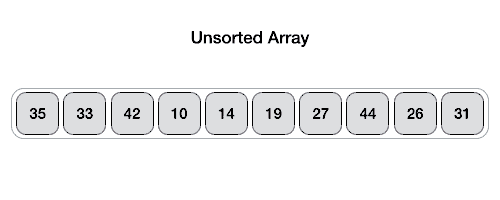📌 相关文章
- 快速排序算法(1)
- 快速排序算法
- 排序算法-快速排序(1)
- 排序算法-快速排序
- 数据结构和算法-Shell排序
- 数据结构和算法-Shell排序(1)
- 数据结构和算法选择排序
- 数据结构和算法选择排序(1)
- 数据结构与算法
- 数据结构和算法 | 8套(1)
- 数据结构与算法(1)
- 数据结构和算法 | 8套
- 数据结构和算法 |组5
- 数据结构和算法-树
- 数据结构和算法 |组5(1)
- 数据结构和算法 | 2套
- 数据结构和算法 | 6套(1)
- 数据结构和算法 | 6套
- 数据结构和算法 | 7套
- 数据结构和算法-树(1)
- 数据结构和算法 | 2套(1)
- 数据结构-合并排序算法
- 数据结构-合并排序算法(1)
- 快速排序
- 快速排序(1)
- 快速排序 (1)
- 快速排序
- 快速排序 c++ (1)
- 排序算法可视化:快速排序
📜 数据结构和算法-快速排序
📅 最后修改于: 2021-01-11 10:24:10 🧑 作者: Mango
快速排序是一种高效的排序算法,它基于将数据数组划分为较小的数组。一个大数组被划分为两个数组,其中一个数组的值小于指定值(例如,枢轴),基于该数组进行分区,另一个数组的值大于该枢轴值。
Quicksort对数组进行分区,然后递归调用两次以对两个结果子数组进行排序。该算法对于大型数据集非常有效,因为其平均和最坏情况下的复杂度分别为O(nLogn)和image.png(n 2 )。
快速排序分区
下面的动画表示法说明了如何在数组中查找枢轴值。

枢轴值将列表分为两部分。递归地,我们找到每个子列表的枢纽,直到所有列表仅包含一个元素。
快速排序枢轴算法
基于对快速分区的理解,我们现在尝试为它编写一个算法,如下所示。
Step 1 − Choose the highest index value has pivot
Step 2 − Take two variables to point left and right of the list excluding pivot
Step 3 − left points to the low index
Step 4 − right points to the high
Step 5 − while value at left is less than pivot move right
Step 6 − while value at right is greater than pivot move left
Step 7 − if both step 5 and step 6 does not match swap left and right
Step 8 − if left ≥ right, the point where they met is new pivot
快速排序枢纽伪代码
上面算法的伪代码可以推导为-
function partitionFunc(left, right, pivot)
leftPointer = left
rightPointer = right - 1
while True do
while A[++leftPointer] < pivot do
//do-nothing
end while
while rightPointer > 0 && A[--rightPointer] > pivot do
//do-nothing
end while
if leftPointer >= rightPointer
break
else
swap leftPointer,rightPointer
end if
end while
swap leftPointer,right
return leftPointer
end function
快速排序算法
递归地使用数据透视算法,我们最终得到了较小的分区。然后处理每个分区以进行快速排序。我们为快速排序定义递归算法,如下所示:
Step 1 − Make the right-most index value pivot
Step 2 − partition the array using pivot value
Step 3 − quicksort left partition recursively
Step 4 − quicksort right partition recursively
快速排序伪代码
要了解更多信息,请参阅快速排序算法的伪代码-
procedure quickSort(left, right)
if right-left <= 0
return
else
pivot = A[right]
partition = partitionFunc(left, right, pivot)
quickSort(left,partition-1)
quickSort(partition+1,right)
end if
end procedure
要了解使用C编程语言进行快速排序的实现,请单击此处。